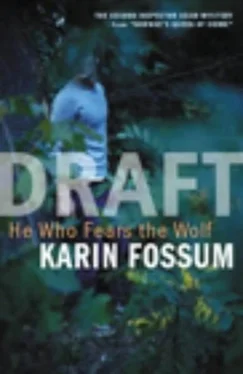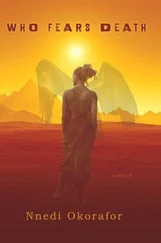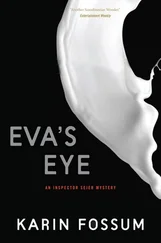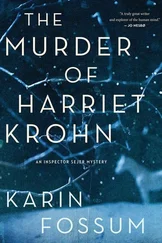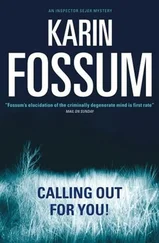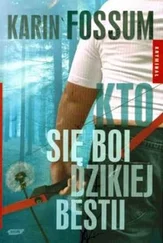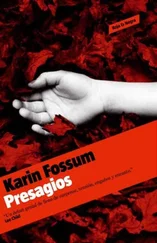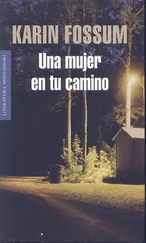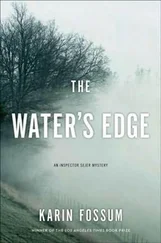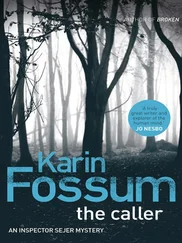He drove past the hospital, veered sharp left at the Orthopaedic Institute, crossed the main street, and entered Øvre Storgate, then drove past the abandoned pharmacy and the central garage. He turned left again and drove across the old bridge, continuing along the south bank, through the industrial area. He approached the railway tracks just as the light turned red. For a moment he considered racing across, but changed his mind. It would attract attention. He snarled between clenched teeth, "Sit still and keep your mouth shut. I've got my gun on you."
His words were wasted. The hostage did not utter a sound. In his rear-view mirror he saw a red Volvo pull up and stop right behind him. The driver drummed his fingers on the steering wheel. Their eyes met in the mirror. He turned to look along the tracks for the train and heard it roaring in the distance; it seemed to him it drowned out the sound of his heart. The hostage remained motionless, staring out of the window. The train thundered past, but the barrier remained down, not moving. He put the car in gear and waited. The car behind him rolled a little closer, almost touching his bumper. On the other side was a green Citroen. Sweat ran into his eyes, but the barrier stayed down. For a wild moment he thought the police had put it there to block his way, that any second they would pull up alongside with loaded guns and take him in. He was trapped. There was no room to turn around and head back. Why the hell wasn't the barrier going up! The train was long gone. The Volvo behind him started revving its engine. He raised his hand, the one holding the pistol, and wiped his brow. At that moment he remembered the green Citroen on the other side, certain that the driver had noticed the gun. At last the barrier rose, slowly and painfully. Looking straight ahead he drove over the tracks. The Volvo turned right and disappeared. He had planned to go across the river, passing the square on the way down, and the police and the throngs of people outside. While they were busy interviewing witnesses, he would drive right past, only 30 metres away. He was impressed with his plan. The problem was the hostage. Without warning, he slammed on the brakes, stopped. The car was parked behind a rubbish skip near the bus station. He pulled on the handbrake. "What I was wondering," he said, clearing his throat, "was what the hell you were doing in the bank so early?"
Silence.
"You're deaf, aren't you? You can't hear a damn thing."
The hostage raised her head. For the first time the robber stared into her flickering green eyes. It was quiet in the car, and it was getting hotter. Uncertain he tried to read the expression on her pale face. Far away he heard a siren. It started out faint, grew louder, and then stopped with a little gurgle. An odd feeling came over him – that he hadn't robbed the bank at all, that it was all a dream without logic, in which peculiar figures came and went and he couldn't understand what roles they were playing.
"All right," he said, jabbing at the hostage with the muzzle of his gun. "A deaf person can hear too, if you tap her on the shoulder."
He put the car in gear, drove across the bridge, and passed the bank. He had decided not even to glance in that direction, but he couldn't help himself. He looked swiftly to the left. A small crowd was huddled around the entrance. One person towered above all the rest. A pillar of a man with short, silver hair.
He should have been working on the murder in Finnemarka. Instead he sat at his desk, staring at a blank piece of paper. By closing his eyes he could see the robber's face before him, almost like a photograph. The problem was trying to describe it to the man sitting across from him.
Many other people had sat in the same place, sweating and struggling to remember everything: a distinguishing characteristic, eye colour, whether the nose was long or short. He was confident that he had a good memory, and he thought he was an observant person. But now he started to have doubts. He was certain that the man's hair was blond, but it occurred to him that the sun flooding the street might have given it a golden sheen. And besides, the man was wearing dark clothing, which could have made his hair seem lighter than it was. His mouth was small, he was certain about that. He seemed to have quite a tan, maybe with a tinge of sunburn. And he remembered his clothes. He was quite muscular, undoubtedly in good shape, but not as tall as he was, actually not tall at all for a man.
Sejer stared at the police artist. He was a newspaper illustrator who had landed in this job by accident and had proved to be pretty talented, especially from a psychological point of view.
"First you're going to get me to relax," Sejer said with a smile. "You want to establish a sense of trust first, don't you? Demonstrate that you're listening to me and believe in me."
The artist gave him a wry smile. "Don't be so afraid of losing control, Konrad," he said. "Right now, you're not the boss. You're only a witness."
Sejer raised his hand in apology.
"The first thing I want you to do," said the artist, "is to forget the man's face."
Sejer looked at him in surprise.
"Forget the details. Close your eyes. Try to see his figure in front of you and concentrate on what kind of impression he makes. What kind of signals is this person sending? He comes walking towards you down the street in broad daylight, and for some reason you notice him. Why?"
"He seemed so tense. So full of something."
Sejer shut his eyes as requested and visualised the man. Now the face was merely a bright, hazy patch in his memory. "His steps were quick and firm. His shoulders hunched. A mixture of fear and determination. Panic lurking just below the surface. So afraid that he didn't dare glance up and look at anyone, even for an instant. Not exactly a professional bank robber. He was too desperate."
The artist nodded and made a note at the bottom of the page.
"Try to describe his body, the way he moved as he walked along."
"His body hardly moved at all. Tiny, choppy movements. No swinging of his arms, no swaying or limping. Straight ahead. Stiff-legged. Stiff across the shoulders."
"Think about the proportions," the artist continued. "His arms and legs in relation to his torso. The size of his head. The length of his neck. The size of his feet."
"His arms and legs weren't out of the ordinary. Rather on the short side. He had one hand inside his bag, and the other in his pocket. A short, thick neck. Not very big feet. Smaller than mine, and I take a size 44. He was wearing loose clothing, but his body gave the impression of being muscular in a bulging sort of way."
More nods. The pencil touched the paper for the first time, and Sejer heard the stroke of graphite on the page. It was just a draft sketch, but it gave the figure a trembling, lifelike quality, something in motion.
"His shoulders? Wide or narrow?"
"Wide. Rounded. The kind you get from lifting weights. Not like mine," he added.
"Oh, yours are very wide."
"But they don't bulge like his. They're more flat and bony, you know."
They both laughed at this. The artist, whose name was Riste but went under the nickname Sketches, was short and pudgy and bald, with small oval glasses and long thin fingers.
"His head?"
"Big. Round. Big cheeks, but not exactly dumpling-shaped. A rounded chin. Not sharp or firm. No cleft or anything like that."
"How did his head sit on his body? If you understand what I mean by that."
"Kind of sunk between his shoulders. His head jutted forward from his body. Like a sulking child."
"Excellent. That's significant," he said. "What about his hairline?"
"Is that important?"
"Yes, it is. A person's hairline establishes a lot about his face. Take a look at your own face. You have a nearly perfect hairline. Straight and even across your forehead, with a nice arc at the temples. And your hair is of the same thickness all along it. That's quite rare."
Читать дальше
